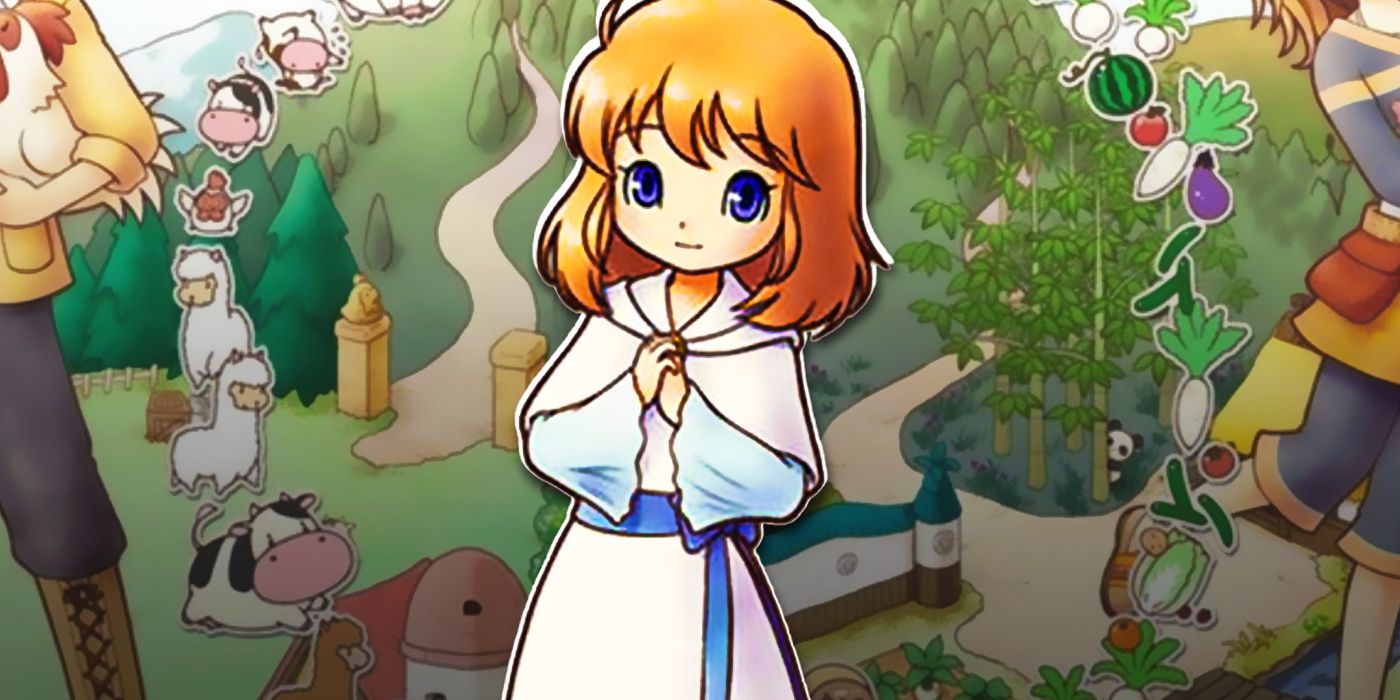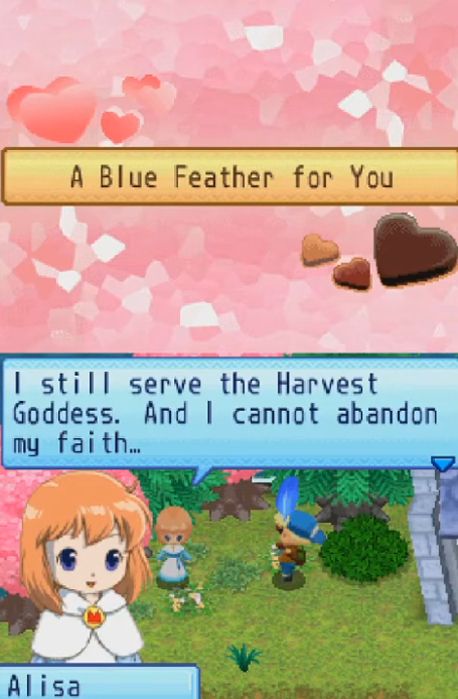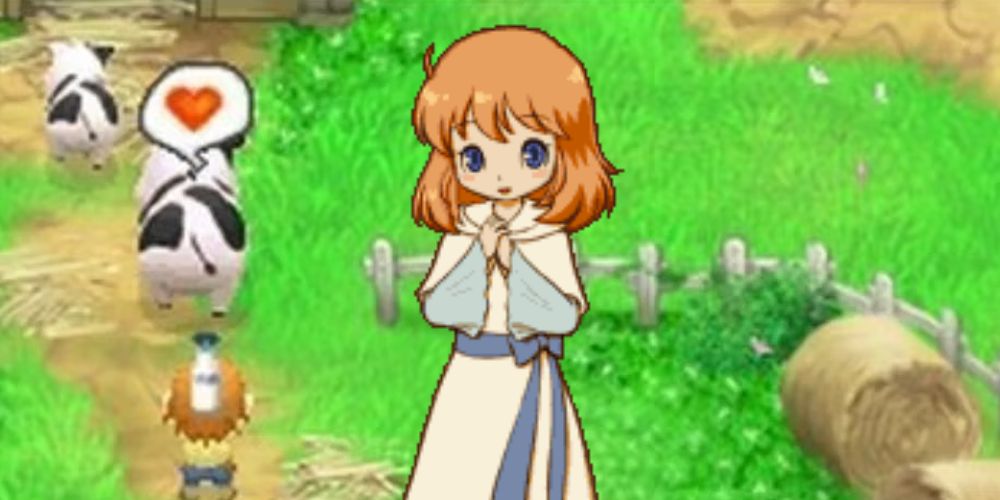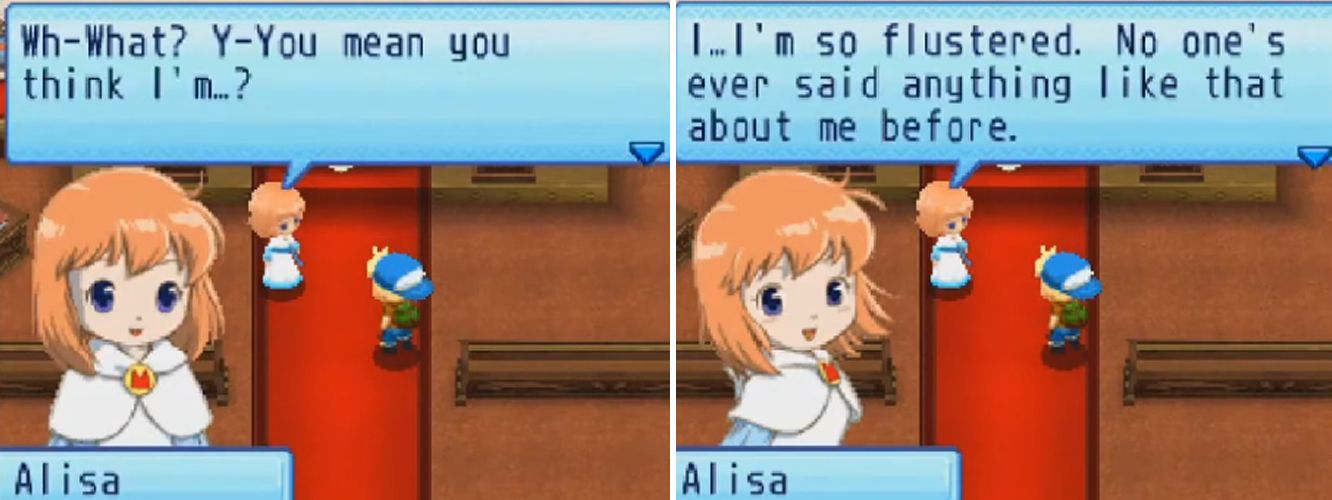Key findings
- Alisa from
Harvest Moon: Sunshine Islands
has love stories but will not marry the player because she is a nun. - Alisa returns to
Harvest Moon: A Tale of Two Cities
as a marriageable character with strict requirements, but without romantic events. - After she married Alisa, she did not want to have children, which suggests that she had taken a vow of celibacy.
The handheld era of Harvest Moon (also known as History of the seasons) franchise was fun. More friends of Mineral Town had a barely human looking Kappa as a marriage option for female players. Harvest Moon – The great adventure in the universe introduced the Witch Princess, whose marriage requirement was that the player had at least 50 livestock dice. Harvest Moon DS Cute The Phantom Thief Skye was added to the cast, who could paralyze women with his “chick beam.” The “special” marriage candidates on the show have always been more than a little quirky, but their weirdness adds to the fun.
However, there is one “special” bachelorette whose romance is more frustrating than fun – or more funny than funny, depending on how the player views the outcome. Alisa from Harvest Moon: Sunshine Islands on the Nintendo DS had its own romantic events and courtship, but in a shocking subversion of the series’ “romantic wish fulfillment” element, It will turn the player down more and more. While Marvelous saw the reaction to it and brought it back Harvest Moon: A Tale of Two Cities Since this is an actual marriageable character, they weren’t done teasing their fanbase and added some caveats.
Alisa’s reason for staying single is possibly the most realistic the series has ever had
A dating sim refusal
There are seven Bachelorettes in Harvest Moon: Sunshine Islandsbut there are eight girls you can romance. This additional lady is Alisa, a nun in the church who serves the Harvest Goddess. Like most other characters in the game, Alisa actually debuted in Harvest Moon: Island of Happinessbut in this version she was a normal villager through and through. In both versions, however, she is a devoted acolyte who does her best to serve the Harvest Goddess alongside the town preacher Nathan.
Alisa did not have much depth in Island of Happiness due to the lack of events in this game that have nothing to do with marriage. Sunshine Islands has designed it, give their heart events like the rest of the Bachelorettes — but she only has three of them. In her heart events, Alisa will declare her devotion to the Harvest Goddess and that she is an orphan.
She is happy to meet the farmer, as she didn’t have many opportunities to interact with her peers during her childhood. This leads to a sweet story arc where Alisa finally starts a family of her own with the player. To everyone’s surprise, that doesn’t happen. While the best options in Alisa’s events are all flirtatious, If she is proposed to, she will refuse.
A key element of Alisa’s character is that she is actually a nun. She tells the player that she will not marry him because she is dedicated to serving the Harvest Goddess. Although the Harvest Goddess religion is never given a name in the series, the game borrows elements from all sorts of world religions, from Christianity to Shintoism. The churches in each game typically look like cathedrals, and Alisa and Nathan are designed to look very similar to the Christian nuns and priests in the real world.
In the largest Christian denomination, Catholicism, nuns and priests famously take a vow never to marry. In a series where players could have a half-kappa baby, it seems like a nun wanting to get married would be the least of their worries, but that wasn’t the case. To make matters worse, by this point both the player and Alisa will have met the Harvest Goddess in person, and the player will know that she is absolutely not the kind of deity who cares about the personal lives of her clergy.
Alisa returned a few games later as a marriageable character
Another attempt in Tale of Two Towns
Some may find the obvious undermining of Alisa’s romance darkly humorous, but it was frustrating for many people who had put so much effort into courting her only to be rejected. Thankfully, the developers listened and In Harvest Moon: A Tale of Two Citiesshe came back – and this time she was actually able to get married. However, there were a few catches that prove Marvelous wasn’t done teasing their fans.
Unlike the other bachelorettes, Alisa had no flower events. While she could go on dates, without events her character had much less substance than other romance options. Her marriage requirements were also absurd: in addition to the game’s normal marriage requirements for other candidates, Alisa must go on at least 100 dates, receive at least 150 gifts (at least one of which must be her favorite item), complete the main story, and the player must collect the six Wonder Stones to be able to wish to marry her. While Dirk has some additional requirements as well, his are only about half as elaborate as Alisa’s.
Alisa’s requirements wouldn’t be so bad if it weren’t for the pacing. Marriage candidates can only go on dates three days a week. So if the player consistently goes on all three dates with Alisa every week until they reach 100, that will take over 33 in-game weeks – about two in-game years if the player never misses a date. And that’s just one requirement out of a whole list. That’s a lot to ask for a character who doesn’t even have flower events.
After the player’s patience pays off, the Harvest Goddess appears to Alisa during the marriage proposal and tells her that she agrees to her marriage. After she disappears again, Alisa explains to the player that her calling was only part of the reason why she did not want to get married: moreover, after losing her parents, she did not want to love anyone, only to lose them again. Now that the Harvest Goddess has made her face her true feelings and gives her her blessing, Alisa accepts the player’s suggestion. However, the developers had one last joke ready after the wedding
Harvest Moon’s E-Rated Vows of Celibacy
Alisa will not have children
Even after Alisa gets married, she won’t give up her devotion to the Harvest Goddess. Since the Harvest Goddess herself told Alisa to follow her heart, it’s understandable that Alisa still has so much respect for her even after the wedding. Apparently, that respect carries over into another common aspect of true clergy: a comprehensive vow of celibacy. Alisa can get married this time, but unlike most of the other marriage candidates in the series, she will never have a child.
The game never says directly why Alisa will not have a child, but after the Sunshine Islands incident, most fans reasonably assumed there were religious reasons. All that work for a waifu with no flower events and no kids. You could see it as a nice comment on mutual respect in a relationship – Alisa is true to her principles and the player won’t try to change that. But in reality, it’s more likely just a final joke about her being a nun.
Since the Harvest Goddess herself could be married and even have a child in previous games, it would be awfully odd if she forbade her clergy from having children. Whatever the case, this is the entire series’ strangest attempt at acknowledging how babies are made – since the nun Alisa can’t have children while the rest of the cast can, it implies that babies aren’t brought by a stork after all…
Harvest Moon Subverting audience expectations in a deliberately frustrating way is nothing new. Whether it’s murdering cattle to win the love of the witch princess, or the infamous ending of the various Wonderful life versions, the mostly light-hearted franchise shows its teeth in the strangest moments. Whether Alisa’s romances in Sunshine Islands And The story of two cities Whether they’re funny or frustrating is up to the player, but Marvelous’ audacity to play such pranks on its players is almost admirable.
Sunshine Islands And The story of two cities were released at a time when Harvest Moon was rather fluffy and older fans felt that the newer games were less appealing to them. Younger kids were less inclined to court Alisa since she had no obvious signs that she could be romantic without looking it up, so the whole joke about her being a nun feels like it was intended as a playful dig at older fans.
The problem is that this jab was more painful than intended: instead of poking fun at players for putting so much effort into wooing one of the least fleshed-out characters in the game, Marvelous could have used that time and effort to write better dialogue and events for the rest of the cast. Alisa being so difficult to marry is part of the joke, but actually it would have been easier to take if she’d at least had flower events. At least the series has never gone that far with a joke marriage candidate since.





